MH17 crash: Ukraine accuses rebels of destroying evidence
- Published
The BBC's Richard Galpin describes "horrific scenes in beautiful fields" where MH17 came down
Ukraine has accused pro-Russian militiamen at the site of the Malaysia Airlines crash of trying to destroy evidence of an "international crime".
For a second day, OSCE monitors at the scene have had their movements restricted by militiamen.
Reports that bodies have been moved prompted anger from the Netherlands. Most of the passengers were Dutch.
The jet was reportedly hit by a missile over a rebel-held area in east Ukraine on Thursday. All 298 people died.
Both Ukraine and the rebels have accused each other of shooting it down.
The Boeing 777 flight MH17 was flying from Amsterdam to Kuala Lumpur. It fell between Krasni Luch in Luhansk region and Shakhtarsk in the neighbouring region of Donetsk.
The passenger list released by Malaysia Airlines, external shows the plane was carrying 193 Dutch nationals (including one with dual US nationality), 43 Malaysians (including 15 crew), 27 Australians, 12 Indonesians and 10 Britons (including one with dual South African nationality), four Germans, four Belgians, three from the Philippines, and one each from Canada and New Zealand.
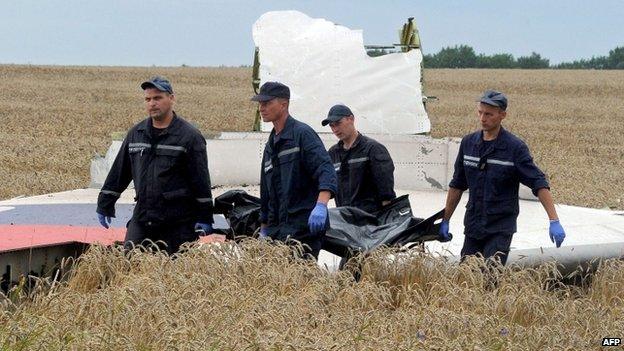
The UN Security Council has called for a full and independent international investigation into the crash
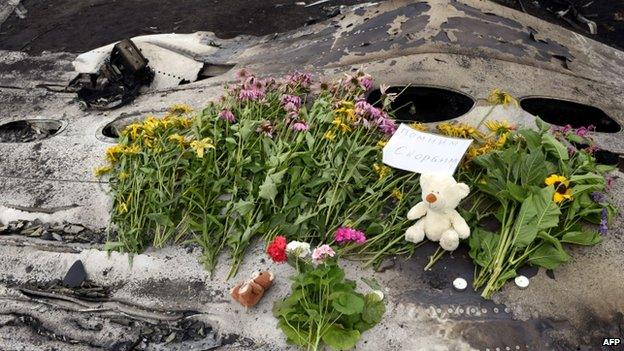
The tragedy has shocked the world community
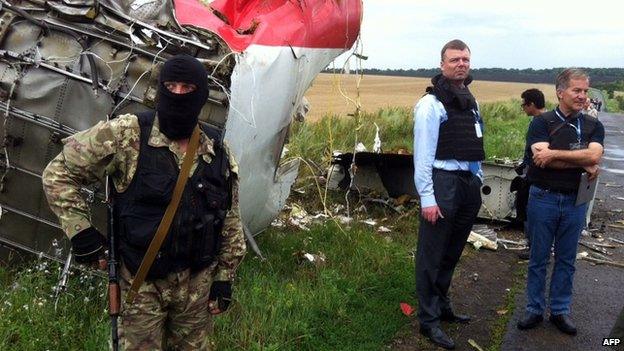
OSCE monitors say pro-Russian gunmen allowed them to visit more of the area on Saturday
Pressure on Russia
In a statement, external, the Ukrainian government complained that pro-Russian rebels had removed 38 bodies from the site near the village of Grabove and taken them to a morgue in the rebel-held city of Donetsk.
The BBC's Richard Galpin, who is at the crash site, says he saw bodies being removed by emergency workers, but it was not clear where they were being taken, nor whether the workers were loyal to the rebels or the government in Kiev.
Dutch Foreign Minister Frans Timmermans, who is visiting Ukraine, said he had been "shocked" by the reported removals.
"As soon as we receive proof, we will not rest until those guilty are put to trial - not only those who pulled the trigger, but also those who made it possible," he said.

At the scene: Fergal Keane, BBC News, Grabove
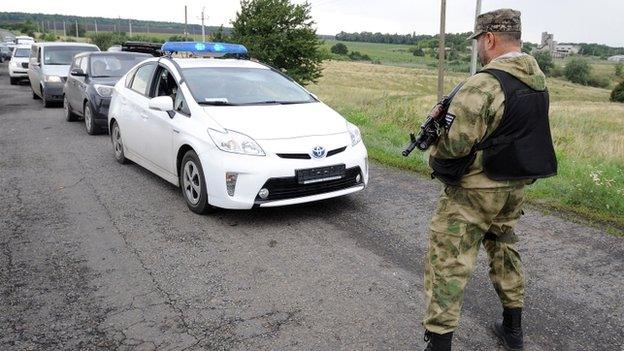
The OSCE monitors were forced to walk to the field where the plane crashed
At the main site the bodies were without covering. Some lay alone. Others were grouped together amid the twisted metal, the bags and cases, the child's playing cards, the guide books, the laptop computer, the duty free whiskey bottle, the woman's hat.
A militiaman with the nickname "Grumpy" - he was squat and barrel-chested with poor teeth and carried a machine gun - harangued me when I asked if the rebels would now stop fighting.
"You are only here because foreigners are dead," he said. And the old story was repeated, the same I have heard on numerous roadblocks - the Western media were all capitalists doing the bidding of their American and EU masters.
When the OSCE turned up in a convoy "Grumpy" came into his own. Now he was a man of power. He halted the OSCE and told them they would have to go forward on foot.

The world community, Ukraine added, must put pressure on Russia to pull back its "terrorists" and allow Ukrainian and international experts to carry out their inquiry.
Speaking in Kuala Lumpur, Malaysian Transport Minister Liow Tiong-Lai said it would be "inhumane" if Malaysian experts would not be given access to the crash site.
He also expressed concern that the site was not properly sealed and could be tampered with.
The monitors from the Organization for Security and Co-operation in Europe (OSCE) are now at the site.
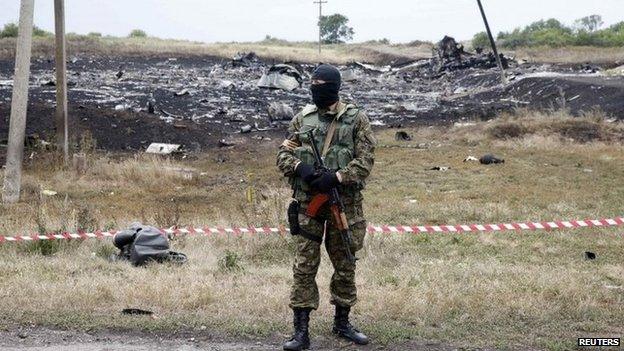
The UK urged Russia to use its influence over the rebels to improve access to the site
OSCE spokesman Michael Bociurkiw said access had improved from Friday and that the monitors were seeing parts of the field they had not seen before.
However he added that their movements were still being restricted. "We are unarmed civilians, we are not in the position to argue heavily with people with heavy arms," he said.
The monitors' mission is to observe the site pending the arrival of international experts being sent to investigate the cause of the crash.
'Act of terrorism'
On Saturday the Russian foreign ministry urged both sides in the Ukrainian conflict "to do everything possible to give international experts access to the aircraft crash".
Earlier, the Russian defence ministry accused the West of waging an information war against Moscow. It challenged Ukraine to produce details of what its anti-aircraft systems were doing at the time.
UK Prime Minister David Cameron and his Dutch counterpart Mark Rutte - who discussed the matter in a phone conversation on Saturday - called on the EU to "reconsider its approach to Russia" following the disaster.
Separatist leaders have denied earlier reports that the plane's flight recorders - the so-called black boxes - had been found.
Ukraine's government called Thursday's disaster an "act of terrorism" and released what they say are intercepted phone conversations that proved the plane was shot down by separatists.
Ukrainian officials also said they had evidence Russian military personnel operated a sophisticated Buk missile system that is thought to have been used to shoot down the plane.
The pro-Russian separatists claim a Ukrainian air force jet brought down the airliner.
